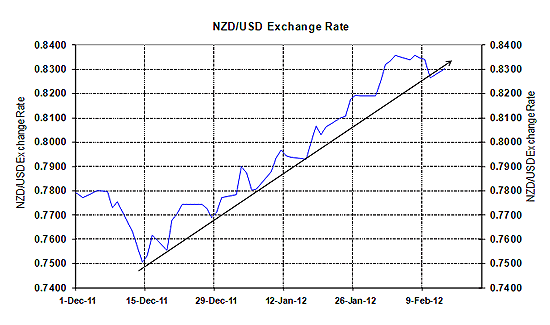
 By Roger J Kerr
By Roger J Kerr
Despite financial and investment markets around the globe being transfixed recently by the hour by hour and day by day developments in Europe as to whether Greece will default on its debt or not, the more likely determinants of NZD/USD exchange rate movements continue to be Australian and Chinese economic data.
The Greeks had no alternative to take their tough austerity medicine, however any positives from their formal approval this morning were probably already priced into currency and equity markets. In other words, I doubt that the Euro and global sharemarkets will strengthen further on the “default avoided” news.
Following the RBA’s decision last week to keep the markets guessing on their OCR changes, their quarterly statement on monetary policy on Friday was arguably not as upbeat on the economy as some may have been expecting.
Overall, their policy prescription is still biased towards further interest rate cuts. Over this next week there is a stack of Australian data being released to provide a clearer steer to FX markets. Expect to see Aussie business and consumer confidence lower and perhaps employment not bouncing back with a big positive following the negative jobs number last month.
Therefore the AUD correcting further downwards to $1.0600 against the USD appears more likely than another push above $1.0800. Add on weaker commodity prices and a stronger USD on global currency markets, both the NZD and AUD should be retreating this week. The anticipated weaker AUD should have a more pronounced influence on near-term NZD/USD movements than firmer local retail and housing data that would otherwise be moderately positive for the NZ dollar value.
Over and above Australian economic releases the next driver of the Kiwi dollar day to day movements will be Chinese economic outcomes. Anecdotal evidence still suggests that activity levels have slowed up in China, although official economic statistics do not show this (yet!).
A reflection on the state of the global economy is that the outlook is improving when three central banks (Australia, European and Chinese) deciding last week not to ease monetary conditions further.
In summary, the upward momentum for the Kiwi dollar from 0.7500 to 0.8400 highs has clearly run out of steam (see chart below) and selling by profit-takers appears more likely than further aggressive buying at 0.8300.
In the short-term a pull back to 0.8000/0.8100 is very much on the cards, however for the Kiwi to be sold below 0.8000 it will take negative news out of China.

--------------------
* Roger J Kerr runs Asia Pacific Risk Management. He specialises in fixed interest securities and is a commentator on economics and markets. More commentary and useful information on fixed interest investing can be found at rogeradvice.com
No chart with that title exists.

We welcome your comments below. If you are not already registered, please register to comment
Remember we welcome robust, respectful and insightful debate. We don't welcome abusive or defamatory comments and will de-register those repeatedly making such comments. Our current comment policy is here.